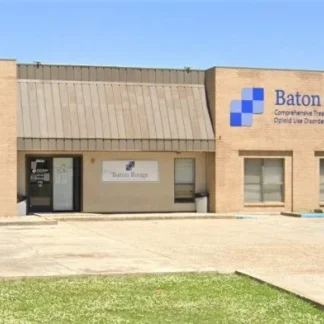Townsend Recovery Center
Townsend Recovery Center offers outpatient treatment for individuals with alcoho...
Baton Rouge Comprehensive Treatment Center (CTC) is a medical detox rehab in Baton Rouge, LA for adults struggling with opioid addiction. Their multidisciplinary team delivers comprehensive care through individualized treatment plans.
Baton Rouge CTC initiates their treatment process with a detailed intake assessment where personalized treatment plans are developed.
Baton Rouge CTC employs medication-assisted treatment (MAT) with FDA-approved medications like methadone, buprenorphine, or Suboxone. Under their medical team’s supervision, patients are able to manage withdrawal symptoms and cravings.
Baton Rouge CTC’s individual therapy sessions allow patients to explore the root causes of their addiction, unpack past traumas, and build strategies for a future without substance dependence. Guided by seasoned therapists, these sessions offer both insight and support.
Group counseling sessions at Baton Rouge CTC foster a supportive community where patients can learn from each other’s journeys, share their own, and build a collective resolve to overcome opioid addiction.
Beyond the core therapeutic services, Baton Rouge CTC believes in a holistic approach to recovery. By addressing the emotional, physical, and psychological facets of opioid addiction, the center ensures a comprehensive healing experience that ensures long-term sobriety.
Contact us for more information: (225) 932-9867

Connect with Baton Rouge Treatment Center by calling their admissions team directly.
(225) 932-9867 Website Get DirectionsThe Commission on Accreditation of Rehabilitation Facilities (CARF) is a non-profit organization that specifically accredits rehab organizations. Founded in 1966, CARF's, mission is to help service providers like rehab facilities maintain high standards of care.
CARF Accreditation: Yes
The Substance Abuse and Mental Health Services Administration (SAMHSA) is a branch of the U.S. Department of Health and Human Services. Established in 1992 by congress, SAMHSA's mission is to reduce the impact of substance abuse and mental illness on American's communities.
SAMHSA Listed: Yes
Research clearly demonstrates that recovery is far more successful and sustainable when loved ones like family members participate in rehab and substance abuse treatment. Genetic factors may be at play when it comes to drug and alcohol addiction, as well as mental health issues. Family dynamics often play a critical role in addiction triggers, and if properly educated, family members can be a strong source of support when it comes to rehabilitation.
Group therapy is any therapeutic work that happens in a group (not one-on-one). There are a number of different group therapy modalities, including support groups, experiential therapy, psycho-education, and more. Group therapy involves treatment as well as processing interaction between group members.
Trauma therapy addresses traumatic incidents from a client's past that are likely affecting their present-day experience. Trauma is often one of the primary triggers and potential causes of addiction, and can stem from child sexual abuse, domestic violence, having a parent with a mental illness, losing one or both parents at a young age, teenage or adult sexual assault, or any number of other factors. The purpose of trauma therapy is to allow a patient to process trauma and move through and past it, with the help of trained and compassionate mental health professionals.
Group therapy is any therapeutic work that happens in a group (not one-on-one). There are a number of different group therapy modalities, including support groups, experiential therapy, psycho-education, and more. Group therapy involves treatment as well as processing interaction between group members.
Trauma therapy addresses traumatic incidents from a client's past that are likely affecting their present-day experience. Trauma is often one of the primary triggers and potential causes of addiction, and can stem from child sexual abuse, domestic violence, having a parent with a mental illness, losing one or both parents at a young age, teenage or adult sexual assault, or any number of other factors. The purpose of trauma therapy is to allow a patient to process trauma and move through and past it, with the help of trained and compassionate mental health professionals.
Trauma therapy addresses traumatic incidents from a client's past that are likely affecting their present-day experience. Trauma is often one of the primary triggers and potential causes of addiction, and can stem from child sexual abuse, domestic violence, having a parent with a mental illness, losing one or both parents at a young age, teenage or adult sexual assault, or any number of other factors. The purpose of trauma therapy is to allow a patient to process trauma and move through and past it, with the help of trained and compassionate mental health professionals.
Townsend Recovery Center offers outpatient treatment for individuals with alcoho...
Cope Team is a private rehab located in Baton Rouge, Louisiana. Cope Team specia...
Beacon Behavioral Health is a private rehab located in Baton Rouge, Louisiana. B...
AppleGate Recovery is a private rehab located in Baton Rouge, Louisiana. AppleGa...